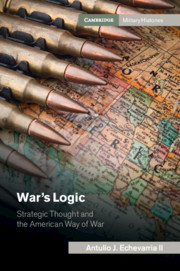Book contents
- War’s Logic
- Cambridge Military Histories
- War’s Logic
- Copyright page
- Dedication
- Contents
- Acknowledgments
- Introduction
- Part I First Principles and Modern War
- Part II The Revolt of the Strategy Intellectuals
- 3 Bernard Brodie, Robert Osgood, and Limited War
- 4 Thomas Schelling and War as Bargaining and Coercion
- 5 Herman Kahn and Escalation
- Part III The Counterrevolution of the Military Intellectuals
- Part IV The Insurrection of the Operational Artists
- Conclusion
- Notes
- Select Bibliography
- Index
4 - Thomas Schelling and War as Bargaining and Coercion
from Part II - The Revolt of the Strategy Intellectuals
Published online by Cambridge University Press: 05 February 2021
- War’s Logic
- Cambridge Military Histories
- War’s Logic
- Copyright page
- Dedication
- Contents
- Acknowledgments
- Introduction
- Part I First Principles and Modern War
- Part II The Revolt of the Strategy Intellectuals
- 3 Bernard Brodie, Robert Osgood, and Limited War
- 4 Thomas Schelling and War as Bargaining and Coercion
- 5 Herman Kahn and Escalation
- Part III The Counterrevolution of the Military Intellectuals
- Part IV The Insurrection of the Operational Artists
- Conclusion
- Notes
- Select Bibliography
- Index
Summary
Chapter 4 analyzes the ideas of Thomas Schelling, especially his bargaining model of war and his concept of strategic coercion. His "America" was also that of Brodie and Osgood. This chapter examines the limitations of both bargaining, which presupposed a shared process of arriving at tacit and explicit agreements, and coercion which assumed consent was a binary – yes, no – process. Both implied US commanders might need to exercise restraint in war just as they were gaining the upper hand, an idea most would have found ridiculous. Schelling’s model of war’s nature was also that of a coiled spring, though he introduced greater uncertainty into the model because tacit agreements can be broken without warning, or might never have existed in the first place.
Keywords
- Type
- Chapter
- Information
- War's LogicStrategic Thought and the American Way of War, pp. 82 - 92Publisher: Cambridge University PressPrint publication year: 2021

